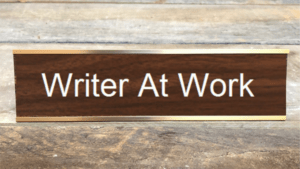 I’ve always said I have a book in me. Over the past year or so, I’ve put pen to paper to write my memoir. Whether this book ever sees the light of day, past the eyes of my family, friends, and writing community, I do not know. But I’m writing it anyway.
I’ve always said I have a book in me. Over the past year or so, I’ve put pen to paper to write my memoir. Whether this book ever sees the light of day, past the eyes of my family, friends, and writing community, I do not know. But I’m writing it anyway.
Who am I to write a memoir? No one special. Just an ordinary person with a story to tell. As many of you already know, my maternal grandmother was diagnosed with Parkinson’s Disease (PD) in the 1980s, and my father received his diagnosis a few years ago. Originally, the purpose of writing this book was to raise awareness by sharing my experience growing up around PD as a child and witnessing it now as an adult. I have a lot of memories of my grandmother, who I remember fondly, and plenty of wonderful and poignant stories about my dad that could fill a book all on its own.
When researching PD, I became familiar with the environmental and genetic factors that could contribute to a diagnosis. One of the things I learned is that certain demographics are at higher risk than others – particularly Ashkenazi Jews like me. So, it isn’t too far of a reach for me to think about my chances of being diagnosed with PD in the future. The only way to know for sure is to consult with a genetic counselor and undergo testing – something I have not yet pursued. But I’m seriously considering it.
While gathering stories and doing research, another important thread recently emerged in my story – that of the caregiver. In this case, my mom. She and her sister cared for their mother decades ago. Today, she is the caregiver of my dad. Although he is doing well and living his best life, I can’t imagine how difficult it is for her to watch the people she loves struggle with the same disease. It can’t be easy. She is just as much of a hero in my book as my dad and grandmother. Her story is just as important to tell as mine and those we love.
A year later, I am sitting on plenty of stories, interviews, facts and figures, and 15,000 words written so far. There are a lot of pieces to put together. It’s complicated. And honestly, I’m not sure where to go from here. What more do I want to say? What should I leave in? What do I take out? What will resonate with others?
Fortunately, I’m attending a conference next month specifically for creative nonfiction writers like myself. I attended last year and came away with a lot of encouragement and interest in my story. This year, I hope to leave with a better sense of direction and a game plan to finish my first draft.
I’ll end with one last thing about the job of writing a memoir. Someone once said, “Each of us is a book waiting to be written, and that book, if written, results in a person explained.” That’s the goal – to share this story, to be known, and to connect with others with similar stories to tell.

Maria
July 22, 2022 at 10:24 am (3 years ago)It’s very exciting that you’re writing a book. I’ve always wanted to but never knew what to write about. I know how you feel about genetic testing. I have 3 aunts (my dad’s sisters) that had Alzheimer’s and even though I would like to know for sure, I really don’t want to know that’s what my future holds.
Elisa
July 22, 2022 at 7:36 pm (3 years ago)It’s a tough call for sure. 🙁
Tamara
July 22, 2022 at 7:21 am (3 years ago)Elisa, I didn’t think this through properly. Testing might reveal you’re not at risk, and therefore give you tremendous peace of mind ♥
Elisa
July 22, 2022 at 7:35 pm (3 years ago)I go back and forth all the time on this. Finding out that I’m not a risk would give me peace of mind. Finding out that I’m at risk doesn’t mean I’m definitely going to get it. Either way, I make a good candidate for the research to find a cure.
Tamara
July 22, 2022 at 7:07 am (3 years ago)PD is cruel. My best friend’s Dad suffers from it. He’s in his early 80s and has a very hard time feeding himself.
I was quick to encourage you to go for the genetic testing. Then I did some googling and found out that there are no specific preventive measures to specifically avoid the changes in the brain that trigger Parkinson’s disease. Makes you think what’s the point in even knowing. You are famliar enough to recognize early symptoms, I guess.
As for your book: it’d be interesting to hear your grandparents’ story, where were their families originally from, how did they meet, what were their living circumstances like back then?
Good luck!